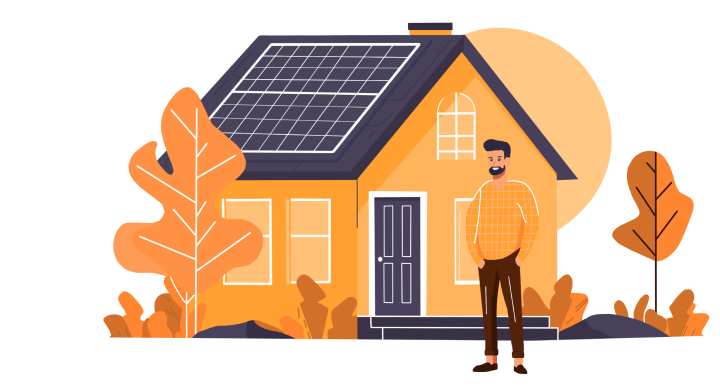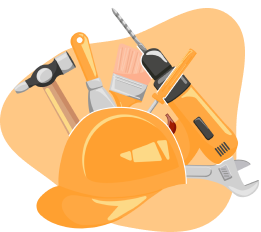Should you self install solar panels or leave it to the professionals? At Solar Energy Host, we get that self-installing solar panels can be tempting. After all, there's a chance you may save on upfront costs by doing so. However, the decision isn't as simple as that.
Understanding the balance between potential cost savings and the inherent risks and responsibilities of DIY installations is crucial. So, in this step-by-step guide, we'll walk you through making this decision carefully while unpacking all the crucial elements in home solar power installation.
Step #1: Assess your skills for a DIY solar panel installation.
Evaluate your technical skills to determine if DIY installation is feasible.
Installing solar panels requires an in-depth understanding of completing a solar panel setup, from electrical wiring and mounting systems to solar panel types and troubleshooting techniques. Without this expertise, installing solar panels by yourself could be risky. Determine whether you have the necessary skills and experience to handle the complexities of installation effectively.
After all, mistakes in these projects can lead to inefficiencies that will affect your system's performance or durability. You may even end up having to pay more in order to fix any damages or redo any steps that weren't done correctly. Plus, a lack of expertise can be a safety hazard as well.
So, if you're wondering if you should self install solar panels, consider your abilities in performing these specialized tasks and the potential risks involved.
Research the local regulations and permits needed for solar panel installation.
It's not as simple as buying DIY solar panels or self-install solar kits and getting to work.
Before you self install solar panels, you also need to determine if you're familiar enough with the proper permits and local regulations essential for any solar installation project. Missing permits or not complying with certain regulations can lead to fines that will just add to the expense.
Professional installers often take care of permits for you, making the process smoother. They can also easily spot if you've missed certain permits or compliance steps.
However, if you're managing the installation on your own, you'll need to navigate these independently. This can make it more likely for you to overlook certain compliance requirements or forget certain permits.
Step #2: Compare the costs, benefits and potential pitfalls of DIY versus professional installation.
DIY installation can save on labor costs but comes with added risks and responsibilities.
One of the main DIY solar panel benefits is the potential cost savings on labor. However, these savings must be weighed against the time, effort and risks involved in the installation of solar panels.
When you self install solar panels, you don't just need a lot of technical know-how. You'll also need to dedicate a lot of time and energy to detailed planning and precise execution. This means having to take many days or even weeks out of your daily routine or job in order to complete the project.
Plus, you also have to make sure that you're prepared for the risks that come with installing residential solar panels without professional experience. DIY installation can leave more room for mistakes, which can lead to inefficiencies, damage and safety hazards. To make things even worse, some panels' warranties are voided if you install them yourself.
Also, without professional expertise, troubleshooting these issues can be time-consuming and dangerous. Instead of being able to save money with solar panels, the potential mistakes that come with DIY installations can be costly and even cancel out anything you saved by not hiring professional contractors.
Professional installation provides warranties, safety assurances and long-term peace of mind.
Professional solar installers ensure that solar energy systems are installed correctly and meet all safety and performance standards. These contractors bring both technical skill and professional experience, guaranteeing that every aspect of the installation—from wiring to panel placement—is done accurately from the start.
Furthermore, most professional services include maintenance packages and warranties that cover both the solar panels and the installation work. This not only financially protects you from potential issues but also gives you long-term peace of mind.
Step #3: Check quotes from different providers with Solar Energy Host.
Easily compare quotes from multiple professional installers.
If you want to self install solar panels, it may be because all the various price points can be intimidating. We get it – reaching out to contractors one by one for a quote or checking dozens of solar installation company sites can be daunting and time-consuming. However, what if we told you that there's no need to resort to DIY installation if you want to get a great deal?
Solar Energy Host delivers competitive quotes from reputable local installers to you, helping you find the best deal for your solar installation with just a few clicks.
This way, you don't have to go through the hassle of gathering estimates yourself just to find licensed professionals fit for the job. With our network of expert installers, you'll find installation contractors who bring experience and expertise to the table, ensuring that your system is set up properly and safely.
Frequently Asked Questions (FAQ)
How do I assess the condition of my roof before installing solar panels?
Before you install solar panels, it's crucial to look out for missing or damaged shingles, as they'll need replacement to ensure no water infiltrates your home. Check for any water stains on your ceilings or walls, which can indicate leaks. Sagging areas can also be a sign of structural problems.
It's recommended to have a professional inspection to evaluate if your roof's structural integrity can support the additional weight of the panels.
What permits and regulations do I need to consider for DIY solar panel installation?
Common permits include electrical, building, interconnection, zoning and solar photovoltaic permits. Each locality has unique requirements, so it's important to contact your local authorities to understand the specific permits you need for your area.
So, before you decide to self install solar panels, consider that you'll need to navigate all these permits and compliance regulations in the process.
What are the most common issues with DIY solar panel installations?
When people self install solar panels, they risk running into common issues like improper panel placement, faulty electrical connections and a lack of compliance with local codes. Mistakes like these can lead to poor system performance, reduced energy output and safety hazards like electrical fires or roof damage.
Building a brighter, more sustainable future
At Solar Energy Host, we believe you should be able to enjoy the advantages of solar panel systems, from access to clean power to solar panel incentives and potential savings, without having to spend so much time and effort just gathering quotes.
That's why we're here to do it for you. By delivering quotes from trusted local installers to you, we make it easier for you to get started on your path to powering your home more sustainably.
See how much it will cost to install solar panels today!














